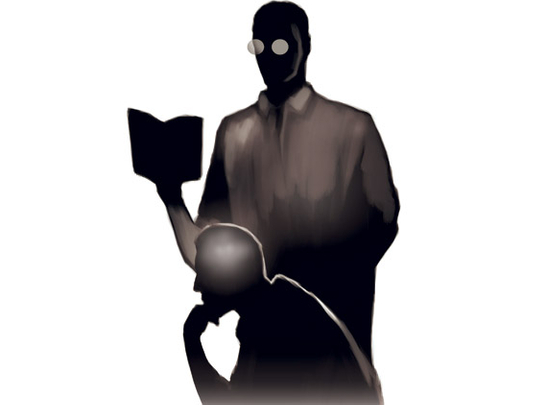
Winston Churchill, Britain's prime minister during the Second World War and a keen painter, once visited Time magazine publisher Henry Luce in his office in the US. Luce, who had one of Churchill's paintings hanging on the wall, made a remark about it to Churchill: "It's a good picture, but I think it needs something in the foreground — a sheep, perhaps."
The next morning, Luce received a call from Churchill's secretary asking him to return the painting. Luce complied but was greatly distressed that his innocent criticism had caused so much offence. A few days later, the canvas was returned and something was added to it — a sheep grazing in the foreground.
Sir Winston Churchill was one of the greatest wartime leaders and politicians. Yet, he knew the power of the written word and that what someone like Luce writes in a magazine such as Time could influence public opinion worldwide. It is no wonder that scholars and men of letters in developed countries have great respect in their societies because they can change the lives of the people who look up to them.
A photo of then presidential candidate Barack Obama carrying a copy of The Post-American World by the Indian-American journalist Fareed Zakaria caused a stir in the US in 2008. Several media outlets picked up the story and accused Obama of supporting the author's argument that the United States is no longer the world's superpower and that other countries such as China, India and Brazil are becoming global players in many fields. The small book in his hands could have had a negative impact on his presidential campaign had it not been for the wittiness of Obama and his campaign organisers. Zakaria's book, on the other hand, gained a lot of attention as a result of this campaign, making it a best-seller.
Formulate strategy
The role of intellectuals in developed societies is greater than many politicians and CEOs because they help formulate the strategy of their states. As soon as a new administration comes into power, it looks for intellectuals like university professors to help it "govern" the country. Obama, for example, has chosen Lawrence Summers, who served as the 27th president of Harvard University, to be the Director of the White House National Economic Council.
This tradition goes back hundreds of years in the West. In the 17th century, Britain made use of the knowledge of Francis Bacon, father of experimental philosophy, whose ideas helped bring about the Enlightenment after the Dark Ages in Europe. His demand for a planned procedure of investigating all things natural marked a new turn in the rhetorical and theoretical framework for science. Other Enlightenment philosophers and scholars influenced political opinion in Europe and other parts of the world. John Locke in Britain advocated the idea of individual consent as the basis for political legitimacy. Voltaire and Denis Diderot in France helped build a new future for their nation which was suffering under a dictatorship.
Certain societies still live in the Middle Ages, where politicians are more influential than thinkers and intellectuals. We should not be surprised if clandestine organisations such as Freemasonry, Knights Templar and others appear in those societies.
Intellectuals unite society when vicissitudes of life divide it. The works of a single Frenchman, Diderot, changed the way people think and get information. He co-founded and was the chief editor of the Encyclopédie, the first encyclopedia to include contributions from the most noted figures of the French Enlightenment.
Enlightenment
Each week, I receive several messages from readers asking how we can develop the Arab world. In order to answer this complex question, we have to give a chance to innovators, thinkers and intellectuals to contribute in building the society and the nation. We should allow them to come up with new schools of thought that will help in the development and enlightenment of society without fear of oppression from religious, political or security institutions.
In other words, Arab governments have to first believe that "culture" is a right just like education and healthcare. The library is no less important than the school; the museum and the theatre directly follow the hospital in terms of importance. No matter where you live in the Arab world, it is impossible to remember the names of ten intellectuals in your city. "Intellectuals" in the Arab world are legends that exist only in history books. They are the hope we are waiting for to shine from behind the clouds of ignorance.
When Bismarck, who oversaw the unification of Germany, learned about the intentions of Napoleon to invade Germany, he sent a letter to the French author and poet, Victor Hugo, appealing to him to ask the French people to stop Napoleon.
Intellectuals are the ones who bear the torch of enlightenment and help write the history and the future. When I talk about "intellectuals", I do not mean those who read the daily newspapers, but those who inspire us and whose photos deserve to be on our banknotes.
Yasser Hareb is an Emirati writer.









